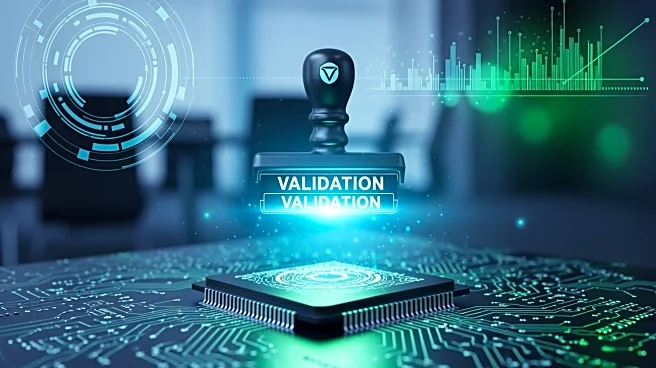What's Happening?
ValGenesis, Inc., a leader in enterprise validation lifecycle management systems, is set to showcase its AI-enabled ValGenesis Smart GxP™ Platform at the ISPE Annual Meeting & Expo in Charlotte, North
Carolina, from October 26-29, 2025. The platform aims to modernize validation processes in the life sciences industry through intelligent automation, predictive insights, and continuous compliance. Attendees will have access to live demos and a new ARC Advisory Group report titled 'Accelerating Innovation and Time to Market in Life Sciences through AI-Powered Validation.' This report, developed with insights from industry experts, highlights how AI is transforming validation into a strategic driver of speed, accuracy, and innovation across product lifecycles.
Why It's Important?
The introduction of AI-enabled validation platforms like ValGenesis Smart GxP™ is significant for the life sciences industry, as it promises to reduce costs, improve compliance, and accelerate innovation. By automating protocol authoring, risk assessments, anomaly detection, and compliance tracking, the platform aims to unify validation, quality, and manufacturing processes. This transformation could lead to faster validation cycles, reduced rework, and continuous audit readiness, aligning with global regulatory frameworks such as the FDA's CSA guidance and EU AI Act. The potential for measurable ROI and improved documentation consistency could benefit life sciences companies by enhancing operational efficiency and strategic capabilities.
What's Next?
ValGenesis has initiated pilot programs with select customers to implement its VAL™ Smart Agents in real-world validation environments. These pilots are designed to quantify time and cost savings, demonstrate compliance readiness, and showcase the business value of AI in regulated operations. As AI in validation moves from concept to reality, ValGenesis plans to share insights from these pilot programs at the ISPE 2025 event, marking a new chapter in validation processes. The company aims to demonstrate how AI can help life sciences companies rethink validation possibilities and drive industry-wide transformation.
Beyond the Headlines
The adoption of AI-enabled validation platforms raises ethical and regulatory considerations, particularly in ensuring compliance with evolving global standards. As AI becomes integral to validation processes, life sciences companies must navigate the balance between innovation and adherence to regulatory requirements. The long-term implications could include shifts in industry practices, with AI-driven validation becoming a norm, potentially influencing regulatory policies and industry standards.









